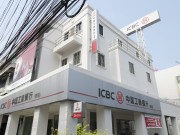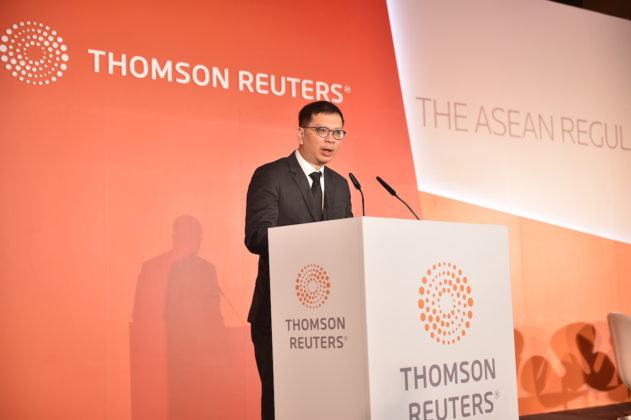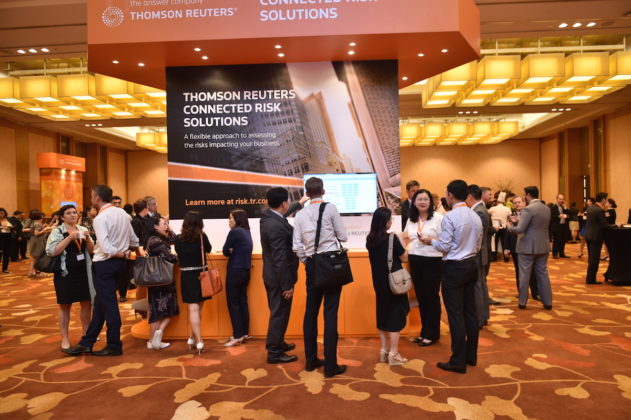
The Insider: Navigating a Future of Regulatory Uncertainty
Changing regulations, bank shutdowns, record fines, increasing regulatory pressures, decreasing profits, competition and innovation are causing severe stress in the global financial industry.
Sanjeev Chatrath, Managing Director and Region Head of Asia (Financial & Risk) at Thomson Reuters, provides an exclusive insider perspective on navigating a future of regulatory uncertainty.
The Stakes Are Higher Than Ever
” THE STAKES ARE HIGHER THAN EVER FOR SENIOR MANAGERS AND BOARDS OF DIRECTORS “
“The stakes are higher than ever for senior managers and boards of directors“ Sanjeev Chatrath, Managing Director and Region Head, Asia, Financial & Risk, Thomson Reuters wrote in his Expert Talk concluding remarks titled: Navigating a future of Regulatory Uncertainty.
The New Regulatory Future
The world is entering a new era of uncertainty around the future of financial regulation as U.S. President Trump vowed to scale back a number of regulatory initiatives.
Major economies around the world are faced with a host of challenges over the coming years, including geopolitical issues.
Changes in Regulations:
- A revocation or scaling back of the Dodd-Frank Act
- Markets in Financial Instruments Directive (MiFID) 2
- European Union’s Fourth Money Laundering Directive (4MLD)
Crackdown on Money Laundering & Corruption
In Asia, a crackdown on money laundering and corruption- related offences in recent years have led to the closure of two banks and the jailing of several financial professionals in Singapore, over regulatory breaches related to the 1MDB investigation.
- Falcon Private Bank Shut Down in Singapore
- EFG International Announces Successful Acquisition of BSI
- Ex-BSI Banker Found Guilty in 1MDB Case
- Swiss Banker is First Foreigner Jailed in Singapore for 1MDB scandal
Trade-based money laundering has also emerged as an area of regulatory attention in the region, which is home to a significant proportion of the world’s shipping sector.
Meanwhile, mutual evaluations by the Financial Action Task Force (FATF) have shown a number of money laundering deficiencies that need addressing in regional AML regimes.
Reacting to Political Changes
Geopolitics look set to threaten to disrupt markets in the years ahead. With the United Kingdom having triggered Article 50 for a withdrawal from the European Union, markets are set for several years of tense negotiations over the terms of the withdrawal.
Some banks have already set into motion plans to move staff from London to other European financial centres as a result. The diplomatic tension over North Korea also threatens to hang over markets.
Thomson Reuters ASEAN Regulatory Summit May 2017
Click to View Photos or View Exclusive Photos from the Thomson Reuters ASEAN Regulatory Summit May 2017 in Singapore
On 9th May 2017, Thomson Reuters held The ASEAN Regulatory Summit for compliance and risk professionals in ASEAN. More than 650 senior risk and compliance professionals attended the by-invitation only event from across banks, financial institutions, regulators, exchanges, and industry bodies.
New Challenges in Innovation & Competition
The financial sector also faces another challenge – that of innovation and competition resulting from rapid advances in financial and regulatory technology. Financial institutions that are not nimble and able to keep up with offerings in the fintech sector risk being at a competitive disadvantage in the fight for market share.
New Technologies
” A DESIRE TO IMPROVE PROCESSES AND CUSTOMER EXPERIENCES “
The rapid rise of FinTech in recent years has spurred a number of specialty sectors, including RegTech, InsurTech or EdTech. What they all have in common is a desire to improve processes and customer experiences through modern technological solutions.
FinTech:
- RegTech (Regulation Technology)
- InsurTech (Insurance Technology)
- EdTech (Education Technology)
For the regulatory compliance sector, RegTech offers to increase efficiency and reduce costs, since many banks hired compliance officers in huge numbers after the financial crisis.
RegTech Developments
RegTech could replace and improve execution of many labour- intensive tasks, such as streamlining the know-your-customer (KYC) process through the use of shared KYC utilities.
Regulators have in recent years began looking actively at how such utilities – in which institutions share their informtion on a common platform – could improve the efficiency of the onboarding process and improve customer satisfaction.
Another technology that has already started to improve bank efficiency is blockchain, which looks set to be used in a growing number of financial technology solutions in the years ahead.
Banks will still face the challenge of modernizing legacy systems to work with the new technology and to find more suitable tasks for employees replaced by technology.
Regulators have welcomed RegTech, with several jurisdictions actively seeking to become the regional hub for FinTech companies. While it has already dampened hiring in the once- hot recruitment market for the compliance sector, banks should still tread cautiously as any large reduction of headcount in risk and compliance functions will invite closer scrutiny from regulators.
Security Threat
Technology can also pose a threat, as banks have continued to see over the past years. Cyber attacks are on the rise, and as banks become more wise to methods of attack, so too do the attackers. Employees are in most circumstances the weakest point in a company’s cyber defence, and firms should ensure they match their cyber defence with an equal effort in staff training.
Culture & Conduct
Regulators continue to remain focused on culture and conduct at financial firms, an issue that spans a wide gamut of banks’ activities.
” HOLD INDIVIDUALS RESPONSIBLE FOR THE FIRM’S CONDUCT “
Following the introduction of the UK Senior Managers Regime a few years ago, Hong Kong’s Securities and Futures Commission (SFC) has this year introduced a similar regime, requiring firms to map out key functions and hold individuals responsible for the firm’s conduct.
Regulators in Asia are also expected to head down this road over the coming years, partly due to the increasingly international nature of many incidents.
Indeed, the increasingly international nature of markets and misconduct has in some cases triggered global responses, such as the FX Code of Conduct and the effort by the Basel Committee on Banking Supervision (BCBS) and the Financial Stability Board (FSB) to ensure banking systems remain sound.
This year will see more developments on banks’ capital calculations under the Fundamental Review of the Trading Book (FRTB) and also new requirements for the reporting and clearing of over-the-counter (OTC) derivatives.
Actionable Intelligence
In such an uncertain regulatory environment, the need for actionable regulatory intelligence is stronger than ever, as risk and compliance departments struggle to keep up.
Thomson Reuters tracks regulators and exchanges across the world. In 2016:
- More than 52,506 regulatory alerts
- An average of more than 201 regulatory changes per day
” AN AVERAGE OF MORE THAN 201 REGULATORY CHANGES PER DAY “
Adding to the complexity, many of the regulatory changes from EU and U.S. regulators will involve some degree of extraterritorial impact, thereby affecting financial institutions in Asia.
Firms will ultimately require up-to-date risk management systems to stay abreast of constant regulatory changes and the risks they address. Regulators have encouraged banks to take a risk-based approach to their business, rather than one based on “tick-box” compliance with rules.
With heightened expectations and responsibility placed on senior managers and boards of directors by regulators, navigating this complex environment remains challenging and the stakes are higher than ever.
The article is edited by Caproasia Online Editorial Team. The original content was written by Sanjeev Chatrath, Managing Director and Region Head, Asia, Financial & Risk, Thomson Reuters: Navigating a Future of Regulatory Uncertainty.
About Sanjeev Chatrath

Sanjeev Chatrath is the Region Head and Managing Director of Financial & Risk, Thomson Reuters – covering Asia Pacific and Japan. He is responsible for client business in the region encompassing end to end client experience, account management, market development, Go to Market regional strategy, sales, operations, and technical functions. Sanjeev is a member of the Global Operating Committee for Thomson Reuters, and F&R.
Sanjeev has worked in Asian financial markets for over 20 years in leadership roles encompassing business management, client management and sales, spanning Asia Pacific, South Asia and Middle East.
Prior to joining Thomson Reuters, Sanjeev worked with Citigroup where he was Chief Operating Officer and Region Head of Client Sales Management for the Treasury and Trade solutions business. Before joining Citi, Sanjeev held senior management positions with ABN Amro Bank, and Standard Chartered Bank based in Singapore, UAE and India.
Sanjeev is a member of the Board of Governors of American Chamber of Commerce Hong Kong, Board Member of ASIFMA (Asia Securities Industry and Financial Markets Association), and a member of 30% Club supporting gender diversity in Hong Kong boards.
Sign Up / Register
Caproasia Users
- Manage $20 million to $3 billion of assets
- Invest $3 million to $300 million
- Advise institutions, billionaires, UHNWs & HNWs
Caproasia Platforms | 11,000 Investors & Advisors
- Caproasia.com
- Caproasia Access
- Caproasia Events
- The Financial Centre | Find Services
- Membership
- Family Office Circle
- Professional Investor Circle
- Investor Relations Network
Monthly Roundtable & Networking
Family Office Programs
The 2025 Investment Day
- March - Hong Kong
- March - Singapore
- July - Hong Kong
- July - Singapore
- Sept- Hong Kong
- Sept - Singapore
- Oct- Hong Kong
- Nov - Singapore
- Visit: The Investment Day | Register: Click here
Caproasia Summits
- The Institutional Investor Summit
- The Investment / Alternatives Summit
- The Private Wealth Summit
- The Family Office Summit
- The CEO & Entrepreneur Summit
- The Capital Markets Summit
- The ESG / Sustainable Investment Summit


















































